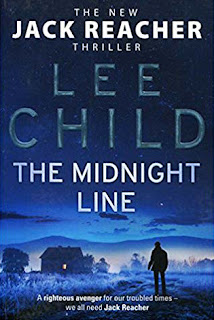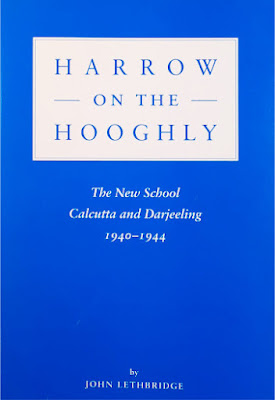The Midnight Line, by Lee Child
A thriller. Short sentences. A page turner. A quick read - for me, a holiday novel. This is a Jack Reacher novel, the one before the latest which is I believe the 23rd. He's a modern incarnation of the medieval knight errant; he can never settle but he travels randomly from place to place and rights wrongs. Yes, the series is totally formulaic but it has to be, Reacher's fans depend on getting the same satisfying read each time. I hadn't read one of Lee Child's books before, and only knew Reacher from one of the two Tom Cruise films. It was good enough to nudge me into choosing this book but I'll be honest, the cover's attractively deep shade of blue may have been just as instrumental.
As I approached the plane some doubts flickered across my mind. 450 pages. Two weeks. I'm really not a fast reader. But those doubts washed away during the two hour flight. Even with all the usual distractions of organising my drinks and snack, I got through sixty pages or so. Interestingly, as I stood up at the end of the flight, and turned to my window seat neighbour to ask if he wanted a bag handed down, he - an American - revealed he'd noticed my book, and was a big Jack Reacher fan. He flew a lot and found the series perfect for taking along. He hadn't read The Midnight Line because he was reading them all in order and was two thirds of the way through. I asked him for a couple of recommendations; I could well read more and will follow his suggestions.
You really don't need to have read any other Reacher books. You pick up the basics along the way, that he was a highly decorated Military Policeman in the US Army, and for reasons which I don't think have been fully revealed yet, since leaving the Army he can't settle, and must forever wander. He has nothing except a passport (ie. ID) and a credit card. He hitches, he stays in cheap motels, he buys new clothes rather than washes them, and he decides where to go next by choosing N, S, E or W on a whim. And he has no weapon. He understands and can use them, but doesn't need them. He is the weapon. He's 6 foot 5, massive in every dimension, but he reads opponents expertly and generally beats them with well timed decisive action and smartly judged psychological pressure.
There's the first mark of Lee Child's skill. This doesn't seem to get old. We know that Reacher's going to beat the baddie, but we're still keen to follow along, because we don't know his plan and we want to know how he's going to do it. Widening the scope, the author keeps us hooked by carefully meting out the information, telling us what we want to know in gradual fashion. It makes sense, because in this book and probably in most others I would imagine, this is where Reacher's motivation is to be found. Because he isn't interested in money.
The need for answers nags at him. In this story, he wants to know what happened to the West Pointer who pawned his or her (it's her) class badge, something inconceivable to him. In due course he assembles a rag-tag group of characters also searching for answers; the shape and size of the challenge reveals itself and they deal with it. It's a little more than a problem of circumstance. I mean, that it's not simply a matter of righting a wrong and delivering justice. It looks to me as if Lee Child has messages he wants to send. Behind the plot of The Midnight Line is a theme dealing with PTSD, and the fair treatment of military veterans. He doesn't beat us over the head with it. It's there, and we do find ourselves thinking about it.
Then there's the question of Jack Reacher as a relatable hero. The big trap for the author is that Reacher is potentially too powerful, a Superman of the real world, if you will. One might feel he's never going to be in real danger. Well, on one level, Child doesn't have to worry about that: he has his committed readers, like my neighbour in the A320, and it would be ridiculous if any of them thought he might actually die when there are still a whole load more books in the series to read. No, the trick is to make him reasonably human. He isn't all knowing; he has doubts, and while he can seem uncaring sometimes, he won't let go of an injustice when his path crosses one. He will connect with people. His body isn't without a degree of pain and exhaustion. After one book, it seems to me the author's found a good balance. I suspect I may feel differently if I read a lot of the books. I may never do that, but my guess is I will read some more, at least.
I lost out in one way. The whole point of taking the book with me on this holiday was that it was disposable. It seemed like I had a good chance of finishing it before I took the return trip, when space in my baggage might be an issue. I wanted to be able to bin it. At the earlier rate of reading, no problem. But this was a trip to a sports tournament. I underestimated how time consuming the days at the stadium would be; three matches a day, and I was too tired to read at the end of each day. On the last day, I could have usefully got rid of the 450 page bulk. But I didn't, I did indeed want to know how it turned out.
As I approached the plane some doubts flickered across my mind. 450 pages. Two weeks. I'm really not a fast reader. But those doubts washed away during the two hour flight. Even with all the usual distractions of organising my drinks and snack, I got through sixty pages or so. Interestingly, as I stood up at the end of the flight, and turned to my window seat neighbour to ask if he wanted a bag handed down, he - an American - revealed he'd noticed my book, and was a big Jack Reacher fan. He flew a lot and found the series perfect for taking along. He hadn't read The Midnight Line because he was reading them all in order and was two thirds of the way through. I asked him for a couple of recommendations; I could well read more and will follow his suggestions.
You really don't need to have read any other Reacher books. You pick up the basics along the way, that he was a highly decorated Military Policeman in the US Army, and for reasons which I don't think have been fully revealed yet, since leaving the Army he can't settle, and must forever wander. He has nothing except a passport (ie. ID) and a credit card. He hitches, he stays in cheap motels, he buys new clothes rather than washes them, and he decides where to go next by choosing N, S, E or W on a whim. And he has no weapon. He understands and can use them, but doesn't need them. He is the weapon. He's 6 foot 5, massive in every dimension, but he reads opponents expertly and generally beats them with well timed decisive action and smartly judged psychological pressure.
There's the first mark of Lee Child's skill. This doesn't seem to get old. We know that Reacher's going to beat the baddie, but we're still keen to follow along, because we don't know his plan and we want to know how he's going to do it. Widening the scope, the author keeps us hooked by carefully meting out the information, telling us what we want to know in gradual fashion. It makes sense, because in this book and probably in most others I would imagine, this is where Reacher's motivation is to be found. Because he isn't interested in money.
The need for answers nags at him. In this story, he wants to know what happened to the West Pointer who pawned his or her (it's her) class badge, something inconceivable to him. In due course he assembles a rag-tag group of characters also searching for answers; the shape and size of the challenge reveals itself and they deal with it. It's a little more than a problem of circumstance. I mean, that it's not simply a matter of righting a wrong and delivering justice. It looks to me as if Lee Child has messages he wants to send. Behind the plot of The Midnight Line is a theme dealing with PTSD, and the fair treatment of military veterans. He doesn't beat us over the head with it. It's there, and we do find ourselves thinking about it.
Then there's the question of Jack Reacher as a relatable hero. The big trap for the author is that Reacher is potentially too powerful, a Superman of the real world, if you will. One might feel he's never going to be in real danger. Well, on one level, Child doesn't have to worry about that: he has his committed readers, like my neighbour in the A320, and it would be ridiculous if any of them thought he might actually die when there are still a whole load more books in the series to read. No, the trick is to make him reasonably human. He isn't all knowing; he has doubts, and while he can seem uncaring sometimes, he won't let go of an injustice when his path crosses one. He will connect with people. His body isn't without a degree of pain and exhaustion. After one book, it seems to me the author's found a good balance. I suspect I may feel differently if I read a lot of the books. I may never do that, but my guess is I will read some more, at least.
I lost out in one way. The whole point of taking the book with me on this holiday was that it was disposable. It seemed like I had a good chance of finishing it before I took the return trip, when space in my baggage might be an issue. I wanted to be able to bin it. At the earlier rate of reading, no problem. But this was a trip to a sports tournament. I underestimated how time consuming the days at the stadium would be; three matches a day, and I was too tired to read at the end of each day. On the last day, I could have usefully got rid of the 450 page bulk. But I didn't, I did indeed want to know how it turned out.




Comments
Post a Comment